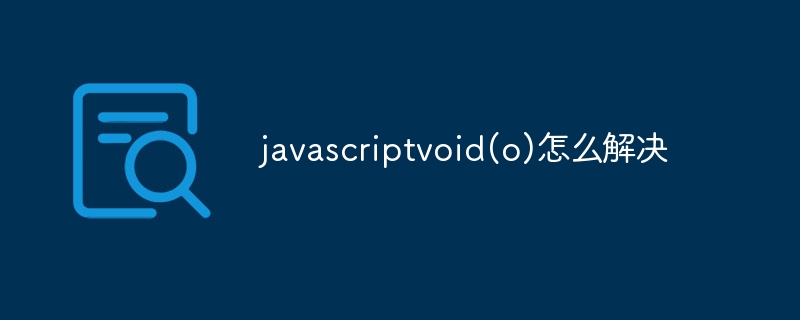Solutions to javascriptvoid(o): 1. Check for syntax errors; 2. Ensure the correct execution environment; 3. Check for conflicts with other codes; 4. Use event delegation; 5. Use other binding methods; 6. Check external resources; 7. Use debugging tools; 8. Update dependent libraries or plug-ins; 9. Check character encoding; 10. Refactor the code to reduce dependencies. Solving javascriptvoid(0) errors requires careful inspection of the code, execution environment, and related dependencies.

javascriptvoid(0) is a common JavaScript statement. Its main function is to ensure that the code does not produce any side effects when executed. This statement is usually used to embed JavaScript code into HTML pages to achieve some dynamic effects or interactive functions.
However, sometimes when parsing or executing JavaScript code, you may encounter errors caused by javascriptvoid(0). This is usually caused by syntax errors in the code, execution environment issues, or conflicts with other code. Here are some suggestions to solve javascriptvoid(0) errors:
1. Check for syntax errors: First, make sure your JavaScript code has no syntax errors. Check that brackets, quotes, etc. match, and that statements are closed correctly. Using the console functionality in the development tools can help you find and fix these errors.
2. Ensure the correct execution environment: javascriptvoid(0) is usually used to embed JavaScript code into HTML pages. Make sure your code executes within the correct HTML tag and that the tag has the correct attributes (such as the event attribute). Also, make sure that your code is executed after the DOMContentLoaded event fires to ensure that all elements in the page have been loaded.
3. Check for conflicts with other code: If your code conflicts with other JavaScript libraries or plug-ins, it may cause javascriptvoid(0) errors. Try disabling or removing other plugins or libraries and re-running your code to see if the problem persists.
4. Use event delegation: If you use a lot of javascriptvoid(0) to bind events on the page, you can consider using event delegation. By binding the event to a parent element and specifying a selector to filter the target element, you can avoid binding the event separately for each target element, thereby reducing the amount of code and potential errors.
5. Use other binding methods: In addition to using javascriptvoid(0) to bind events, you can also try to use other binding methods, such as using the onclick attribute directly in the HTML tag or using the JavaScript addEventListener method. to bind events. These methods may be more stable and reliable than javascriptvoid(0) in some cases.
6. Check external resources: If your page references external JavaScript files, make sure these files are accessible and error-free. Sometimes network problems or server failures may cause external resources to fail to load, causing errors related to javascriptvoid(0).
7. Use debugging tools: Use the browser's developer tools to easily debug and analyze JavaScript code. By viewing error messages, monitoring variables, and the execution stack in the console, you can gain greater insight into how your code is executing and where problems lie.
8. Update dependent libraries or plug-ins: If you use some third-party libraries or plug-ins and encounter errors related to javascriptvoid(0), try to check if an update is available. Sometimes these issues may be known bugs that have been fixed in newer versions.
9. Check the character encoding: Make sure your HTML and JavaScript files use the same character encoding to avoid encoding compatibility issues. Common character encodings include UTF-8 and ASCII.
10. Refactor code to reduce dependencies: If your code depends on other parts of the code or a specific execution environment, it may lead to instability and potential errors. Try to refactor your code to reduce dependencies and make the code more modular and reusable.
In short, solving javascriptvoid(0) errors requires careful inspection of the code, execution environment and related dependencies. By carefully analyzing the error message, using debugging tools, and trying different solutions, you can usually find the source of the problem and resolve it.
The above is the detailed content of How to solve javascriptvoid(o). For more information, please follow other related articles on the PHP Chinese website!